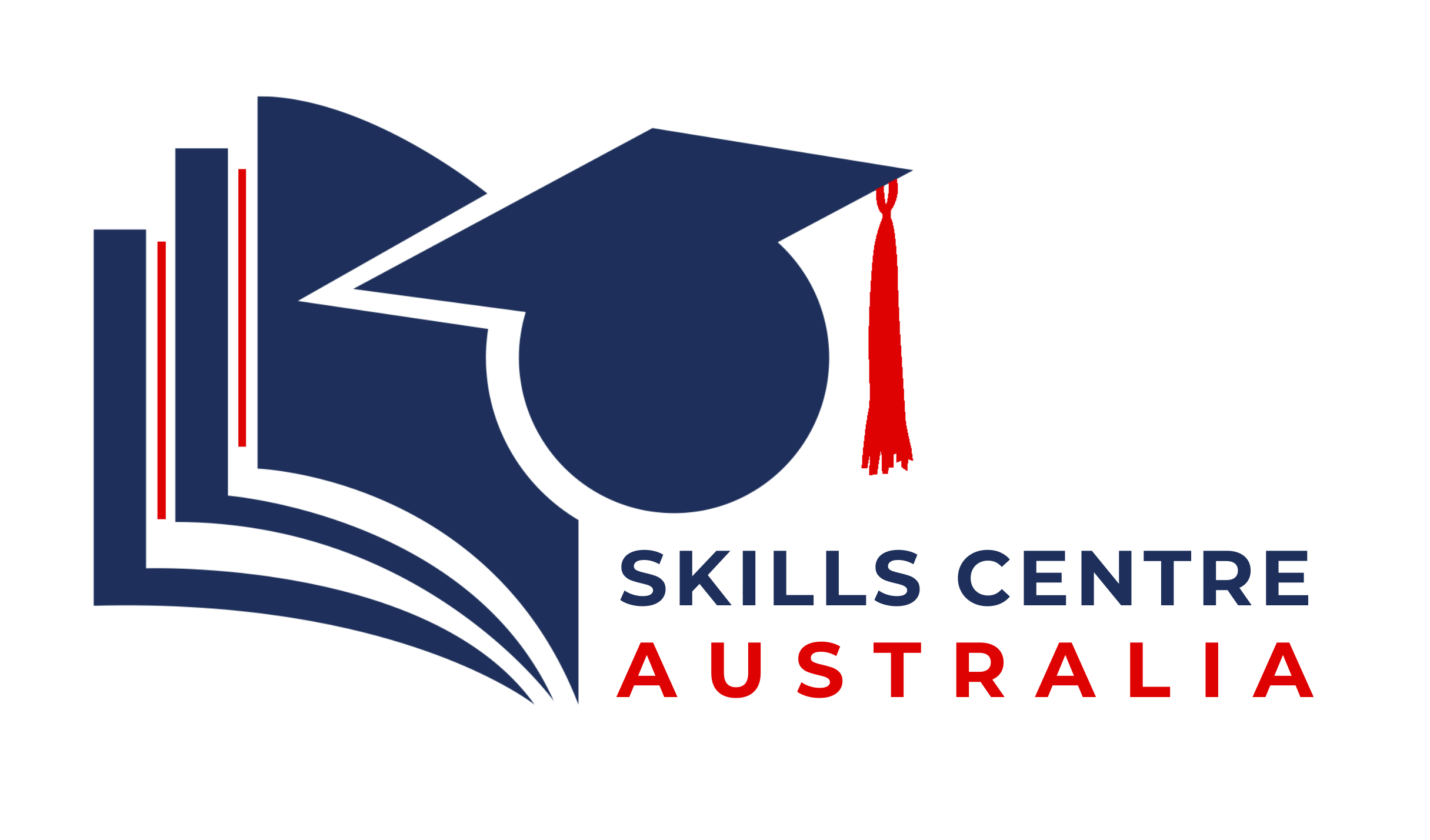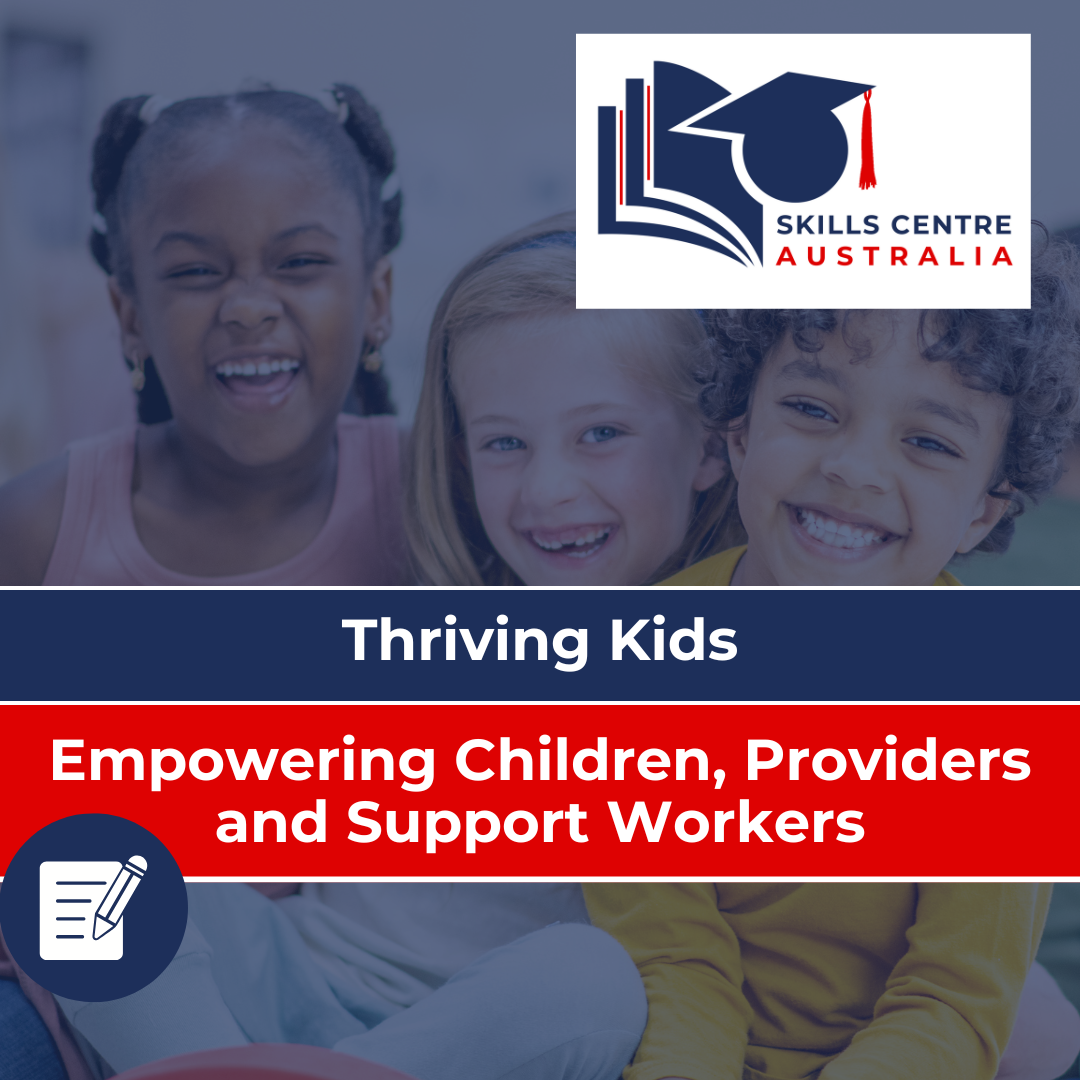Australia is embarking on an important new journey with the launch of Thriving Kids, a national program designed to strengthen early supports for children with developmental delay, or mild to moderate autism and their families. For organisations and professionals in the disability and allied-health sectors, Thriving Kids presents both challenges and opportunities. In this article, we will explore what Thriving Kids is, how it will work for providers and support workers, what impact it may have, and how training through Skills Centre Australia can play an enabling role.

What is Thriving Kids?
Thriving Kids is a federal government initiative starting on the 1st of July 2026, with a commitment of $2 billion over 5 years to support children aged 0-8 years who have mild to moderate developmental delays or autism. Its focus is on earlier identification of developmental concerns and establishing a national system of supports.
It resulted from reforms that will place those with disabilities and their families back at the centre of the NDIS.
“Establishing an effective national system of supports for parents and children outside the NDIS is an important part of these reforms.”
Thriving Kids will see children deemed to have a ‘permanent and significant disability’ continue to be supported under the NDIS. Thriving Kids targets those who currently fall outside or beneath that threshold. The program aims to reduce barriers to early diagnosis and ensure consistent, equitable access to intervention and support services across states and territories.
The program will build and scale on existing mainstream and community services to better support families and children in the settings they are already connected to. This includes child and maternal health, GPs, playgroups, early childhood education care and schools.
The final design and implementation will be determined in consultation with state/territory governments, experts and community stakeholders, drawing on the NDIS review and insights from the Thriving Kids Advisory Group.
Thriving Kids is not merely an extension of existing disability services; it aims to integrate early childhood, health, education, and allied health systems, linking families with timely, developmentally appropriate supports.

How Thriving Kids Will Work For Providers?
Organisations that deliver early intervention, allied health, therapy, assessment, or developmental supports will see new roles and responsibilities under Thriving Kids.
Accreditation and Eligibility – Providers may need to meet new standards, credentials, or accreditation requirements to participate. Governments are likely to define eligibility criteria (e.g., qualification levels, evidence of service quality, or outcome tracking capabilities) to ensure consistency across jurisdictions. Skills Centre Australia provides training that equips providers to meet the new qualification requirements and industry standards.
Service Pathways and Referrals – Thriving Kids is expected to create structured referral pathways. Providers will receive referrals from healthcare, early childhood settings, or developmental screening programs. They will need to coordinate with other service sectors, such as health and education, to deliver integrated supports. With well-trained support workers, providers can streamline services and ensure families receive the help they need. Whether it’s attending appointments or offering day-to-day assistance, trained workers act as both a support and a communication bridge.
Funding and Payment Models – Rather than ad hoc or patchwork funding, providers may operate under contracts or block grants, service agreements, or outcome-based payment models. Flexibility, efficiency, and measurement will be important. Transparent reporting and accountability will likely be part of the model.
Reporting and Outcomes – Given the national scale, data collection and outcomes monitoring will be crucial. Providers will need to track child development outcomes, family well-being measures, service uptake, and possible compliance benchmarks. When providers employ skilled and properly trained support workers, they can more effectively track developmental progress, maintain compliance, and deliver higher-quality care to children and their families.
Collaboration and Integration – Thriving Kids encourages cross-sector collaboration. Providers will likely partner with health, education, and community organisations to deliver holistic service packages. This means increased emphasis on coordination, interagency communication and shared decision making. Courses like Introduction to Support Work, through Skills Centre Australia, cover the essential areas such as documentation and best-practice standards, ensuring clear communication between workers, families, allied health professionals, and organisations, with the support worker at the centre of this connection.
Providers will need to scale their capabilities to align with the new standards. They will need to improve data systems and work more collaboratively than ever before.

How Thriving Kids Will Work for Support Workers
Support Workers work on the front line, and under Thriving Kids, their roles may shift in several ways:
Expanded Roles and Responsibilities – Support workers might deliver more early-childhood developmental interventions, coaching for families, group programs, or multidisciplinary support in settings beyond clinics, such as preschools and early education. The program’s emphasis on early identification means that support workers may engage sooner in a child’s life, not only after severe issues emerge. Support workers who are trained to adapt to evolving roles and responsibilities are better equipped for long-term success. With the right skills, they can confidently respond to any situation.
Increased Demand and Workforce Growth – With new funding and greater access, demand for support workers is likely to increase. There will be more employment opportunities, but also competition and higher expectations of professionalism. Our Introduction to Support Work course is designed to give workers a strong foundation in the requirements of the role, ensuring they meet provider expectations and industry needs. As the demand for qualified support workers becomes more competitive, those with higher qualifications and specialised training will stand out to employers and open themselves up to greater opportunities. For providers, having well-trained staff increases service quality and creates more possibilities for delivering effective care.
Training, Upskilling, and Certification – Support workers may be required to attain new credentials or certifications in specialty areas such as early intervention, autism support, and developmental delay training. Continuous professional development (through training with Skills Centre Australia) will be more important than ever.
Accountability and Measurement – Support workers may be more directly involved in measuring outcomes and reporting their intervention impacts. This may include training in assessment tools, structured reporting, and evidence-based practice. Effective communication of outcomes is a vital skill in the care sector, and one that can be strengthened through targeted training.
Collaboration and Communication Skills – As services integrate across sectors, support workers must liaise with clinicians, educators, families, and other providers. Strong communication, coordination and team skills will be increasingly valuable.

How Skills Centre Australia Can Help
Skills Centre Australia is well-positioned to help providers and support workers gear up for Thriving Kids. Here’s how:
At Skills Centre Australia, we pride ourselves on delivering customised training programs that can be developed or adapted to cover emerging topics, including those introduced under the Thriving Kids initiative. Our expert trainers are dedicated professionals who continuously upskill and undertake ongoing professional development, ensuring that the education we provide is always current, evidence-based, and aligned with industry best practice needs.
All our courses are designed in line with the NDIS High-Intensity Skill Descriptors and follow strict best-practice guidelines, giving providers and support workers the confidence that their training meets the highest standards.
Our commitment to flexible delivery means training can be completed in person, online, or even within your own workplace for maximum convenience.
Skills Centre Australia plays an essential role in preparing the workforce by equipping you with the skills, frameworks, and confidence that you need to thrive under the system.
If your organisation or staff are eager to be ready for Thriving Kids, now is the time to plan training pathways, audit current capabilities, and engage expert partners, like us. Skills Centre Australia is ready to support that transformation. For more information, please visit our website here, or give us a call on (08) 8340 6875.

